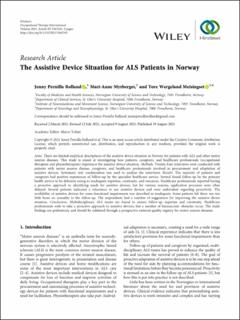| dc.contributor.author | Rolland, Jenny Pernilla | |
| dc.contributor.author | Meisingset, Tore Wergeland | |
| dc.contributor.author | Myrberget, Mari-Anne | |
| dc.date.accessioned | 2021-09-20T07:22:26Z | |
| dc.date.available | 2021-09-20T07:22:26Z | |
| dc.date.created | 2021-09-01T13:38:06Z | |
| dc.date.issued | 2021 | |
| dc.identifier.citation | Occupational Therapy International. 2021, . | en_US |
| dc.identifier.issn | 0966-7903 | |
| dc.identifier.uri | https://hdl.handle.net/11250/2779011 | |
| dc.description.abstract | Aims. There are limited analytical descriptions of the assistive device situation in Norway for patients with ALS and other motor neuron diseases. This study is aimed at investigating how patients, caregivers, and healthcare professionals (occupational therapists and physiotherapists) experience the assistive device situation. Methods. Twenty-four interviews were conducted with patients with motor neuron disease, caregivers, and healthcare professionals involved in procurement and adaptation of assistive devices. Systematic text condensation was used to analyse the interviews. Results. The majority of patients and caregivers had positive experiences of follow-up by the specialist healthcare service. Several found follow-up by the primary health service to be deficient owing to inadequate expertise, continuity, and resources. Healthcare professionals reported having a proactive approach to identifying needs for assistive devices, but for various reasons, application processes were often delayed. Several patients indicated a reluctance to use assistive devices and were ambivalent regarding proactivity. The availability of assistive devices for some functional impairments was described as inadequate. Some patients felt there was too little focus on sexuality in the follow-up. The respondents had a number of suggestions for improving the assistive device situation. Conclusions. Multidisciplinary ALS teams are found to ensure follow-up expertise and continuity. Healthcare professionals wish to take a proactive approach to assistive devices, but a number of bureaucratic obstacles occur. The study findings are preliminary and should be validated through a prospective national quality registry for motor neuron diseases. | en_US |
| dc.language.iso | eng | en_US |
| dc.publisher | Hindawi | en_US |
| dc.rights | Navngivelse 4.0 Internasjonal | * |
| dc.rights.uri | http://creativecommons.org/licenses/by/4.0/deed.no | * |
| dc.title | The Assistive Device Situation for ALS Patients in Norway | en_US |
| dc.type | Peer reviewed | en_US |
| dc.type | Journal article | en_US |
| dc.description.version | publishedVersion | en_US |
| dc.source.journal | Occupational Therapy International | en_US |
| dc.identifier.doi | https://doi.org/10.1155/2021/5563343 | |
| dc.identifier.cristin | 1930486 | |
| dc.description.localcode | Copyright © 2021 Jenny Pernilla Rolland et al. This is an open access article distributed under the Creative Commons Attribution License, which permits unrestricted use, distribution, and reproduction in any medium, provided the original work is properly cited. | en_US |
| dc.source.articlenumber | 5563343 | en_US |
| cristin.ispublished | true | |
| cristin.fulltext | original | |
| cristin.qualitycode | 1 | |

